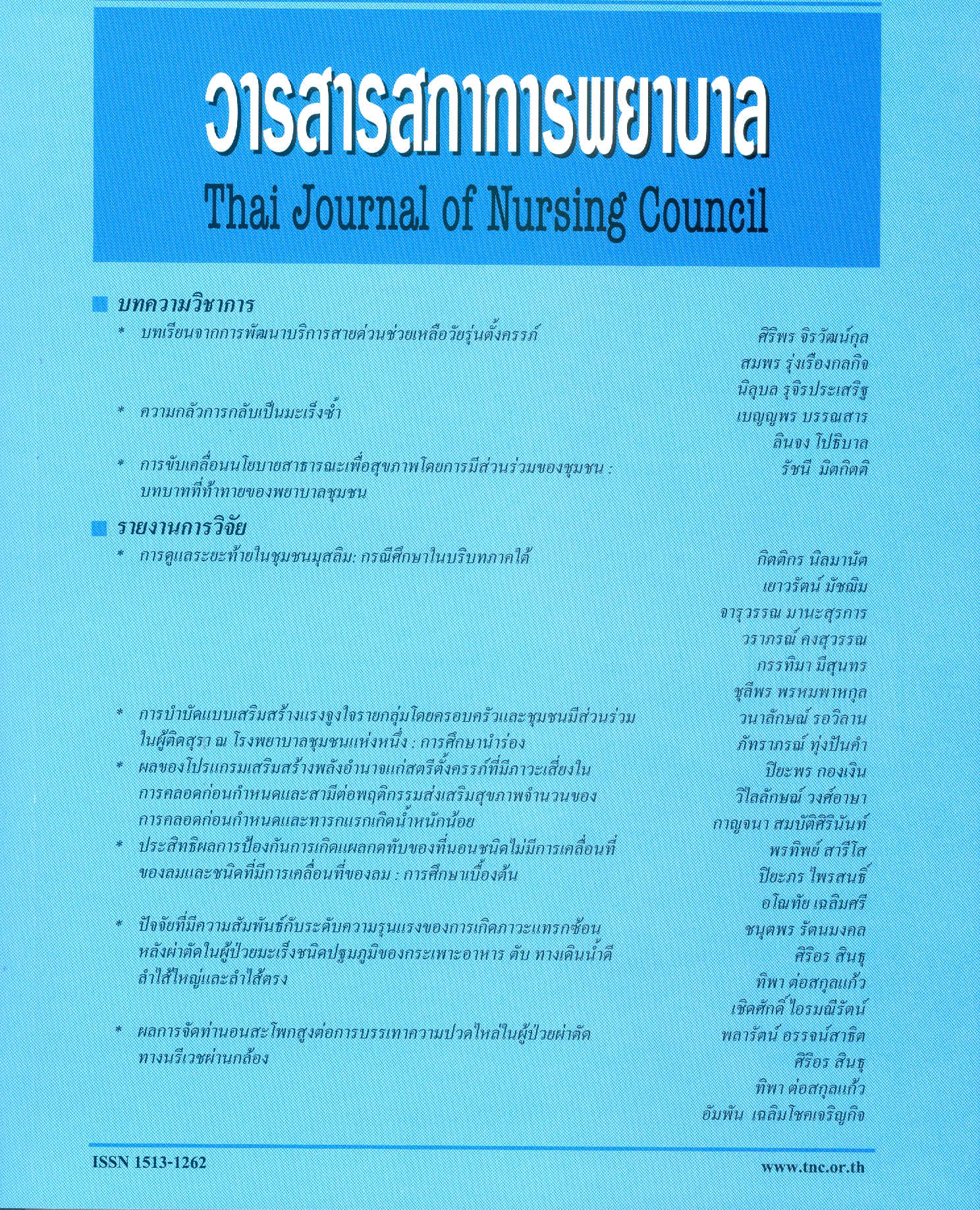การดูแลระยะท้ายในชุมชนมุสลิม: กรณีศึกษาในบริบทภาคใต้; Terminal Patient Care in a Muslim Community: A Case Study in a Southern-Thai Context
Keywords:
กรณีศึกษา, ชุมชน, การดูแลระยะท้าย, มุสลิม, case study, communities, terminal care, MuslimAbstract
Objective: To examine stakeholders’ caretaking methods and roles in caring
for terminal patients in Muslim communities in Southern Thailand.
Design: Qualitative case study.
Procedure: Data were collected by means of interviews, observation,
and group discussions, from January to October 2013. In total,
51 informants participated in the study, consisting of healthcare
personnel, community leaders, religious leaders, local
administrative officials, volunteers, patients, and caretakers.
Qualitative content analysis method was used to analyse the data.
Results: The study produced two major findings. First, caring
procedure for terminal patients in the Muslim communities studied
was conducted in three stages. The terminal stage mainly involved
symptomatic management and treatment-related decisions. The dying
stage involved spiritual care. The after-death stage focused on
providing the deceased’s family members with psychological
encouragement. Second, the stakeholders who played
significant caretaking roles were nurses,
volunteers, local administrative officials, and religious leaders.
Nurses’ major responsibility was to take care of the patients and their
families. Volunteers visited the patients at their homes to give moral support
and spiritual care. Local administrative officials provided
necessary resources. Religious leaders concentrated
on caring for the patients’ spiritual conditions.
Recommendations: This study has led to a better understanding of
caretaking methods for terminal patients in Southern Thai Muslim
communities. It has also revealed the roles of caretaking
stakeholders in those communities.
The results of this study could be applied to developing a caretaking model
to improve the quality of terminal care for patients in
Muslim communities.
วัตถุประสงค์ของการวิจัย: เพื่อศึกษาลักษณะการดูแลและบทบาทของผู้มี
ส่วนได้ส่วนเสียในการดูแลระยะท้ายในชุมชนมุสลิมในภาคใต้
การออกแบบการวิจัย: การวิจัยเชิงคุณภาพแบบกรณีศึกษา
วิธีการดำเนินการวิจัย: เก็บข้อมูลโดยการสัมภาษณ์ การสังเกต และการสนทนากลุ่ม
ผู้ให้ข้อมูลจำนวน 51 คน ประกอบด้วย บุคลาการทางสุขภาพ ผู้นำชุมชน ผู้นำศาสนา เจ้าหน้าที่
องค์การปกครองในท้องถิ่น อสม. ผู้ป่วยและผู้ดูแล ตั้งแต่เดือนมกราคม ถึงเดือนตุลาคม
พ.ศ. 2556 วิเคราะห์ข้อมูลโดยใช้วิธีวิเคราะห์เนื้อหาเชิงคุณภาพ
ผลการวิจัย: ผลการวิเคราะห์ข้อมูล สรุปข้อค้นพบที่ได้ออกเป็น 2 ประเด็นได้แก่
ประเด็นที่ 1 การดูแลผู้ป่วยระยะท้ายในชุมชนมุสลิม แบ่งออกเป็น 3 ระยะได้แก่ 1) ระยะท้าย
เน้นการจัดการอาการและการตัดสินใจเกี่ยวกับการรักษา 2) ระยะใกล้ตายเน้นการดูแล
ด้านจิตวิญญาณ และ 3)ระยะหลังการตาย เน้นการประคับประคองจิตใจของครอบครัว และ
ประเด็นที่ 2 บทบาทของผู้มีส่วนได้ส่วนเสียในการดูแลผู้ป่วยระยะท้ายในชุมชน โดยพยาบาล
มีบทบาทหลักในการดูแลผู้ป่วยและครอบครัว ให้ข้อมูลและประสานงาน ส่วนอสม.ทำหน้าที่
ในการติดตามเยี่ยมบ้านและช่วยเหลือให้กำลังใจผู้ป่วย และดูแลจิตวิญญาณ องค์การปกครอง
ส่วนท้องถิ่นเน้นการสนับสนุนด้านทรัพยากร และผู้นำศาสนาเน้นการดูแลด้านจิตวิญญาณ
ข้อเสนอแนะ: ผลการวิจัยครั้งนี้ช่วยให้เข้าใจการดูแลระยะท้ายในชุมชนมุสลิมใน
ภาคใต้มากขึ้น รวมถึงเข้าใจบทบาทของผู้มีส่วนได้ส่วนเสียในการดูแลผู้ป่วยระยะท้ายใน
ชุมชน ผลการศึกษาสามารถใช้เป็นแนวทางในการพัฒนารูปแบบและส่งเสริมคุณภาพการ
ดูแลผู้ป่วยระยะท้ายในชุมชนมุสลิม








